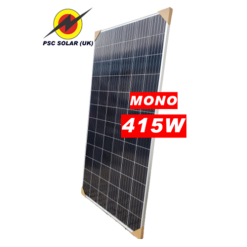Rising electricity bill costs are forcing all of us to consider alternative options for electricity.
One option that comes to mind is solar panels. Solar panel costs vary based on your location, type, and installation. But thanks to energy efficiency, it’s possible to save on energy bills beyond this basic upfront cost.
Let’s find out how much solar energy can cost you.
How much do solar panels cost?
As technology has advanced, the average cost of solar panels has decreased. According to the Solar Energy Industries Association, an average-sized condominium costs about N139,000. However, the cost will depend on the type of panel you choose for your home.
Below, we detail the possible costs for different types of solar panels.
Cost of monocrystalline solar panels
Monocrystalline solar panels are generally considered the most energy efficient option.
The panels cost between N139,000 – N150,000.

Polycrystalline solar panel cost
Although less energy efficient than monocrystalline solar panels, polycrystalline solar panels tend to be slightly cheaper.
Thin film solar panel cost
Thin-film solar panels are the last option we’ll cover. However, these types of solar panels are usually not used in residential environments because they require more roof space. With this, thin film solar panels are commonly used in industrial environments.
Regardless of the cost of the system itself, you need to consider the cost of installation. The installation includes several steps, including:
Survey: Choose your solar power provider and our engineers will inspect your home. Some solar companies work with local contractors to complete this step, while others, like PSC SOLAR UK; have in-house experts to simplify the process.
Either way, the purpose of the survey is to determine if your roof can accommodate the required system. Engineers will also check the electrical system for compliance with plan.
Design: After the company clearly understood the roof, we designed a system for home. We are asked to approve the design before the project proceeds.
Permits: Permits and documentation must be completed by the company prior to installation of the panels. Usually the solar company handles this arduous step and obtains all the necessary permits for your home to install solar energy.
Installation: After obtaining the authorization, the physical installation can begin. This step usually takes 1-3 days. However, the schedule depends on the size of the system.
Connection: Finally, it is time to officially connect the system to mains. Your solar panels then generate energy for your home.
Do Solar Panels Save Homeowners Money?
Obviously, installing solar panels requires a significant upfront investment from homeowners. However, once you cover the initial cost, you can start saving on your electricity bill.
How much you can save depends largely on your energy needs and the amount of sunlight around your home.
On average; your solar panel system will pay for itself in just 10 years, allowing for a 26% federal tax credit. Then the energy produced by your system will be pure profit. It may take years to break even, but all the previous savings increase your income.
In the end, solar panels can save you money. While you won’t feel the rewards immediately after a large upfront cost, the reduced bill is a relief for most homeowners.
Bottom Line: Solar Panels May Be Worth the Cost for Some Homeowners
Solar power can help you save on monthly bills. However, the cost savings come after significant upfront costs. If you’re seriously considering installing solar panels, take the time to compare offers from us. Depending on the region, the cost difference can be significant.

